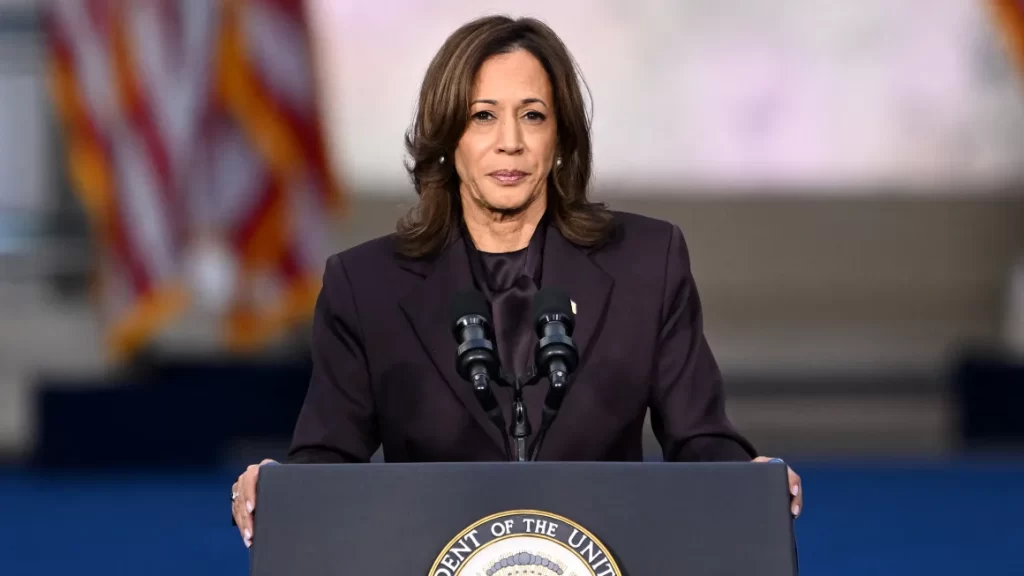After two presidential losses, women wonder what it will take to shatter the glass ceiling
4 min read
Vice President Kamala Harris speaks at Howard University in Washington, DC, on November 6, 2024. Saul Loeb/AFP/Getty Images

Vice President Kamala Harris speaks at Howard University in Washington, DC, on November 6, 2024. Saul Loeb/AFP/Getty Images
After two presidential defeats, many women are left wondering what it will take to break the glass ceiling in American politics. Kamala Harris did not become the first female president this week, but for some, the fact that a Black woman was able to run for the nation’s highest office was a significant milestone. Janet Edwards, a 53-year-old from Washington, D.C., reflected on Harris’ campaign before the November 5 election results were in, choosing to focus on the progress made rather than the defeat.
“I’m not going to step away from what’s possible in the future,” Edwards said. “There will be challenges, but that’s part of the journey, especially for a woman of color.”
For many Democratic women, Harris’ loss is particularly painful, as her candidacy offered hope for women of color who had overwhelmingly supported her. Once again, the highest political office in the U.S. proved elusive for women, even as countries like Italy, North Macedonia, and Mexico have elected women as heads of state in recent years. In contrast, American voters have twice chosen Donald Trump over the women who have come closest to the presidency.
Women have been campaigning for the presidency for over 150 years. Victoria Woodhull was the first woman to run for president in 1872, followed by Shirley Chisholm in 1972, the first Black woman to seek the office. Chisholm’s slogan—“Unbought and Unbossed”—was echoed in Harris’ 2020 campaign. It was only in the last 16 years that a woman’s election seemed within reach. In 2008, Hillary Clinton narrowly lost the Democratic nomination to Barack Obama but saw her 18 million primary votes as progress. In 2016, she won the Democratic nomination but lost the presidency to Trump, despite winning three million more votes.
Harris, who did not compete in a primary, launched her campaign later than expected after Joe Biden’s endorsement. Her campaign condensed two years of work into just a few months and sought to appeal to centrists while facing a sitting president with low approval ratings and a struggling economy.
The defeat, however, raises questions for many women about why the U.S. isn’t ready for a woman president. Melinda Corey, a 56-year-old from Washington, D.C., voiced frustration with the electorate’s reluctance to elect women to the top job. “I’m ready for a female president, but I don’t think most of America is,” she said, adding that while it’s painful to acknowledge, it feels like gender plays a role.
Despite Harris’ loss, there were notable successes for women in the election. In 2025, there will be a record 13 female governors. Angela Alsobrooks and Lisa Blunt Rochester will become the first Black women to serve in the U.S. Senate from Maryland and Delaware, respectively, and Julie Fedorchak of North Dakota and Sarah McBride of Delaware will make history as the first openly transgender woman elected to Congress.
For Harris’ supporters, her campaign marked a crucial step in normalizing the idea of women in high office. Kelly Dittmar, a scholar at the Center for American Women and Politics, said Harris’ run proved that women can raise significant campaign funds and connect with voters on critical issues. Still, Dittmar also noted the challenges women face, including gendered attacks and perceptions that the country is not ready to elect a woman as president.
Nadia Brown, a political science professor at Georgetown University, pointed out that while Americans are comfortable with women in leadership roles, there are still limitations on what kinds of leaders are acceptable. “Research shows that Americans are open to women leaders, but not all women in every type of leadership role,” Brown explained.
Kamala Harris’ own approach to her history-making career has been measured. She has often downplayed the significance of her gender and race, as evidenced in a 2017 interview where she said, “I’ve always been a woman, but I’m sure a man could do the job just as well.” At the Democratic National Convention in 2020, she wore a black suit instead of the white worn by delegates to symbolize the suffragette movement, further indicating her reluctance to emphasize the historic nature of her campaign.
In her concession speech in November 2024, Harris reflected on the disappointment many felt but urged them not to give up. “Don’t ever give up,” she said. “And don’t you ever listen when anyone tells you something is impossible because it has never been done before.”
The question now is whether history will continue to repeat itself. After Trump’s victory in 2016, a wave of female political engagement surged, resulting in record numbers of women in Congress. Six women even ran for the Democratic nomination in 2020, including Harris. Christina Reynolds of EMILY’s List emphasized that this isn’t just a passing trend but a “sea change” in the political landscape. “There are still women standing up for our rights and bringing our voices to the table,” she said.
As the fight for a female president continues, Harris’ journey and the historic victories of other women in politics signal that change, while slow, is on the horizon.